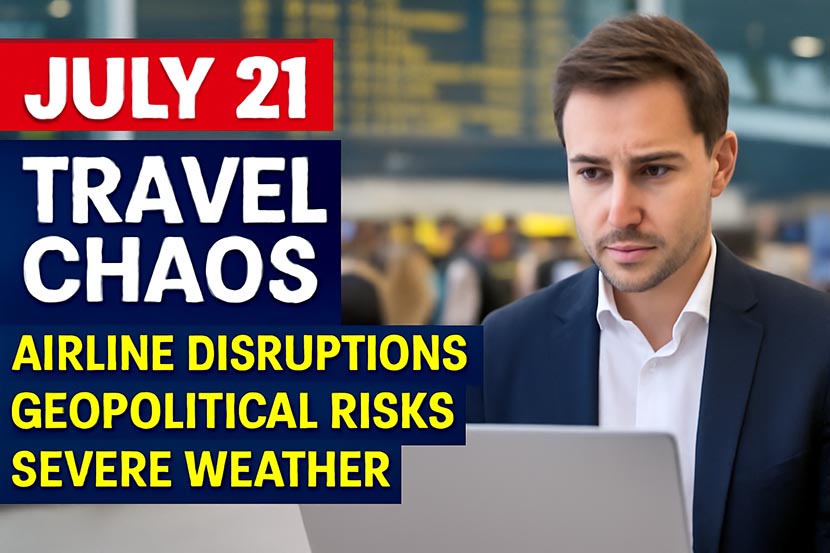Tuesday, July 22, 2025
Atlanta, USA, July 21, 2025: The travel landscape is defined by a perfect storm of challenges, from airline chaos to escalating geopolitical risks and severe weather disruptions. Airlines worldwide are grappling with widespread IT outages, leading to massive delays and cancellations, leaving thousands of passengers stranded. At the same time, political tensions are rising across key regions, with countries like Canada, UK, and others issuing urgent travel advisories due to security concerns.
Travelers are being warned to avoid non-essential trips to areas marked by civil unrest, terrorism, and escalating conflicts. As if that weren’t enough, extreme weather events like storms in Europe and typhoons in Asia are grounding flights and halting travel plans. With so much uncertainty, travelers must stay vigilant, keep an eye on real-time updates, and adjust their plans accordingly to navigate these disruptions effectively. The road ahead for global travel looks anything but predictable.
Governments are sounding alarms on travel safety with new advisories targeting a growing number of countries. Canada’s government has expanded its warnings to include Mexico, Spain, Kenya, China, Vietnam, Denmark, Bahrain, and several other destinations, citing rising crime, political instability, and shifting geopolitical tensions. These updates highlight a rising global trend towards heightened caution for international travelers. The UK has also issued new high-risk advisories, adding Burkina Faso to its list alongside countries like Belarus, Afghanistan, and Russia. Travelers planning trips to these nations are urged to avoid all non-essential travel, especially with the rising threat of terrorism and escalating civil conflict.
As the world becomes more divided by political unrest, governments are moving quickly to protect citizens abroad, triggering uncertainty and prompting cautious decision-making among those planning trips. This surge in political instability is impacting the global tourism flow, adding a layer of complexity for travelers trying to stay informed and safe.
In an unexpected twist, the airline industry is now battling a technological crisis, with widespread IT outages disrupting operations at major carriers worldwide. Airlines such as Alaska, American, United, Delta, and Qantas have all reported massive flight delays and cancellations due to critical IT system failures. These outages have wreaked havoc on reservations, baggage handling, and flight tracking systems, leaving thousands of passengers stranded at airports and forcing many to reschedule flights at the last minute.
For many travelers, this breakdown in airline operations represents a significant frustration, especially during peak travel times. With the global aviation system already under pressure due to high demand, these disruptions add a level of unpredictability that forces travelers to stay on alert for changing schedules. In such an environment, maintaining flexibility and frequent checks for flight status is more important than ever.
Political friction in Europe has prompted urgent travel advisories for several key countries. Tensions between Russia and NATO have escalated, affecting neighboring Poland, the Baltic States, and the UK. Tourists are being advised to steer clear of protests, monitor embassy alerts, and be prepared for tightened border security measures. These developments create a challenging environment for travelers who had planned vacations or business trips to these regions.
As political divisions deepen, governments are increasingly issuing recommendations to avoid non-essential trips to these affected areas, putting a damper on tourism and creating a climate of caution for those planning travel.
In addition to geopolitical tensions and airline IT failures, extreme weather events are adding to the travel chaos. In Europe, powerful storms in Amsterdam, Paris, and London have grounded flights, leading to significant delays across major international airports. British Airways, Turkish Airlines, Lufthansa, Emirates, and TAP Air Portugal are just a few of the airlines impacted by these weather-related disruptions.
Travelers flying through these affected airports are advised to expect long delays, check flight statuses frequently, and prepare for possible rerouting. The storm disruptions, combined with rising demand for air travel, create a frustrating environment for those hoping to reach their destinations on time.
Meanwhile, Asia is facing its own set of weather-related challenges. Typhoons and monsoon rains have ravaged East and Southeast Asia, causing widespread flight cancellations in countries like Indonesia, Japan, Hong Kong, and China. Airports in Jakarta, Hong Kong, and Beijing have been particularly affected, leaving travelers scrambling to reschedule or find alternative routes amid growing uncertainty.
Economic Pressures and Border Policies Impact Tourism
On the economic front, regions in the US are feeling the impact of tighter border policies and a weaker Canadian dollar. Warren County, New York, for example, has reported a significant drop in Canadian tourism, affecting local revenue during the peak travel season. Stricter border controls, rising fuel costs, and a declining exchange rate are all contributing factors to this downturn. Similar trends are being seen in counties across Washington and Florida, where the tourism industry is struggling to recover.
As travelers reassess their spending and the affordability of cross-border trips, the financial strain on local communities is becoming increasingly evident. This could result in long-term shifts in tourism patterns, with travelers opting for more budget-friendly alternatives or postponing their vacations altogether.
A Tumultuous Travel Landscape
The travel industry is experiencing unprecedented challenges, with political tensions, severe weather, and technology failures disrupting global travel plans. As travel advisories mount, airlines grapple with IT issues, and weather conditions worsen, the uncertainty surrounding travel shows no signs of abating. For travelers planning trips this summer, staying informed and flexible is key. With the global landscape in flux, the future of travel depends on adaptability, vigilance, and the ability to navigate an increasingly complex and dynamic environment.
Tags: airline disruptions, Asia typhoon, bahrain, Business Travel, Canada, canadian tourism, china, denmark, europe travel, flight cancellations, global travel, International travel, IT outages, kenya, mexico, poland, political tensions, severe weather, spain, Tourism industry, travel advisories, Travel Policies, UK, US Tourism, Vietnam
